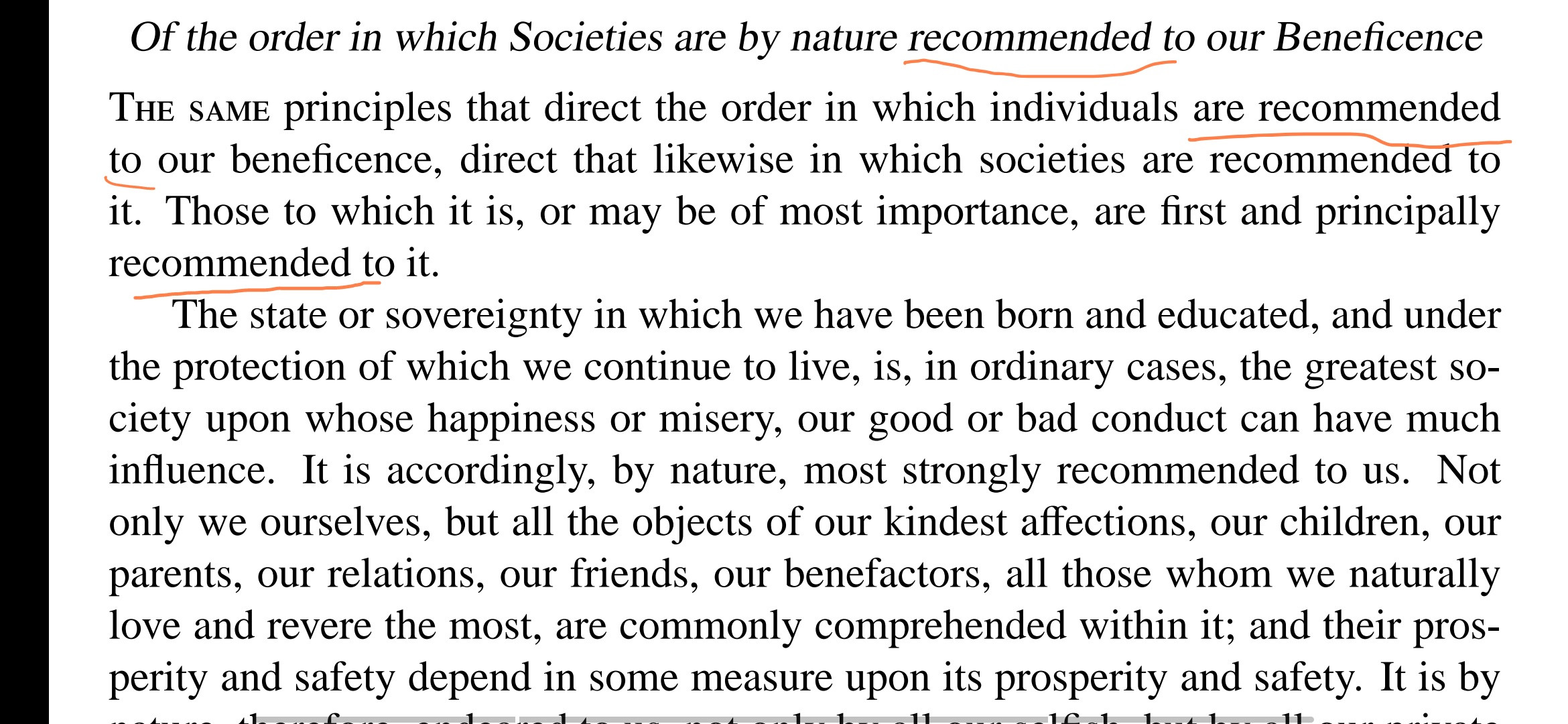This is an excerpt from The Theory of Moral Sentiments by Adam Smith.
-
A question I couldn't answer after numerous readings of this paragraph: what is the referent of "it" in "Those to which it is…"?– LPHCommented Jul 28, 2020 at 12:35
-
"Recommend to", in this sense, means to give the object of "to" (be it a person or organization) a recommendation favorable to the subject. This is not an "archaic" usage, but it is rather formal.– Hot LicksCommented Jul 28, 2020 at 13:28
3 Answers
This use of recommend is rare now but at the time of Adam Smith was common but formal:
OED
recommend
3 b. transitive. To commit (oneself or another) to a person or thing, or to someone's care, prayers, etc. Cf. recommand v.1 1c. Now rare.
1713 tr. in R. Steele Guardian No. 17 He led her to a Relation's House, to whose Care he recommended her for that Night.
1742 H. Fielding Joseph Andrews I. ii. xi. 245 Fanny..was..recommended to the Care of a Maid-Servant of the House, who helped her to [...] dress, and clean herself.
-
Thank you so much for your kind explanation! I understand it now. Commented Jul 29, 2020 at 9:06
The same principles that direct the order in which individuals are recommended to our beneficence, direct that likewise in which societies are recommended to it.
The following is my understanding of the text above:
The same principles that direct the order in which individuals are recommended to use their beneficence (for someone) are also recommended to a society to decide upon its order of beneficence for individuals, which are part of it.
"Order" as used in this text, means certainly
- "a natural, moral, spiritual, or social system in which things proceed according to definite laws (Middle English) (Shorter Oxford English Dictionary).
"Society" means
- "The system of customs and organization adopted by a body of (esp. human) individuals for harmonious and interactive coexistence or for muual benefit, defence, etc. (mid 16th century)".
"Recommend" signifies in this particular context
- "Procure a favourable reception for; make acceptable or desirable to or to a person (early 17th century)" .
The sentence "The same principles that direct the order in which individuals are recommended to our beneficence, direct that likewise in which societies are recommended to it." has then the following meaning.
- The principles in the system which we use to judge individuals and thus favour some rather than others are the same as the principles in the system ("that likewise") we use for the similar purpose of judging societies and favouring some of them over others.
-
Using a meaning that is restricted to Middle English for a document that was written in the 18th century is rather dubious. Why do you think this is justified? Commented Jul 28, 2020 at 12:34
-
I think that order means ranking here; otherwise the second sentence (Those to which ...) doesn't make any sense. Commented Jul 28, 2020 at 12:41
-
@PeterShor The period specification is the period of first recorded use; only when two periods appear side by side is the word not in present use (for instance "ME-E16"); the second period is then that of last recorded use.– LPHCommented Jul 28, 2020 at 12:42
-
@PeterShor Would then individuals be recommend to our beneficence according to ranking? That is not the case, it would be to restrictive a system.– LPHCommented Jul 28, 2020 at 12:47
-
Thank you for the exhaustive answer! I do have some doubts on the specific words listed above, and among them, "recommend" confuses me most. Now I can thoroughly understand the passage with your help, which is also useful for understanding the whole bookd cuz those words are used so many times in it. Commented Jul 29, 2020 at 9:20

